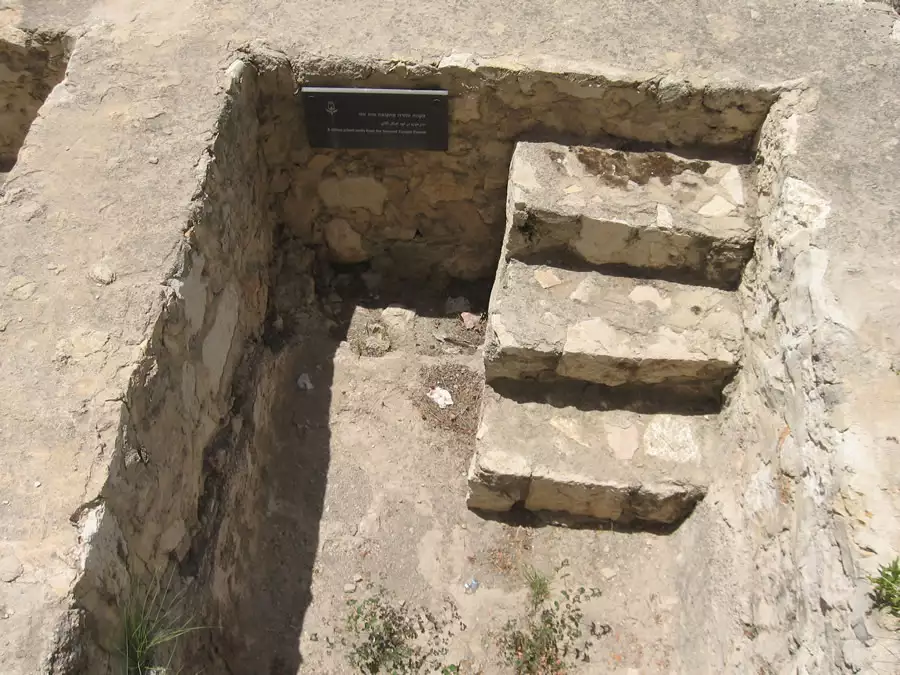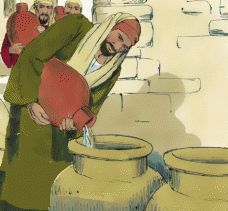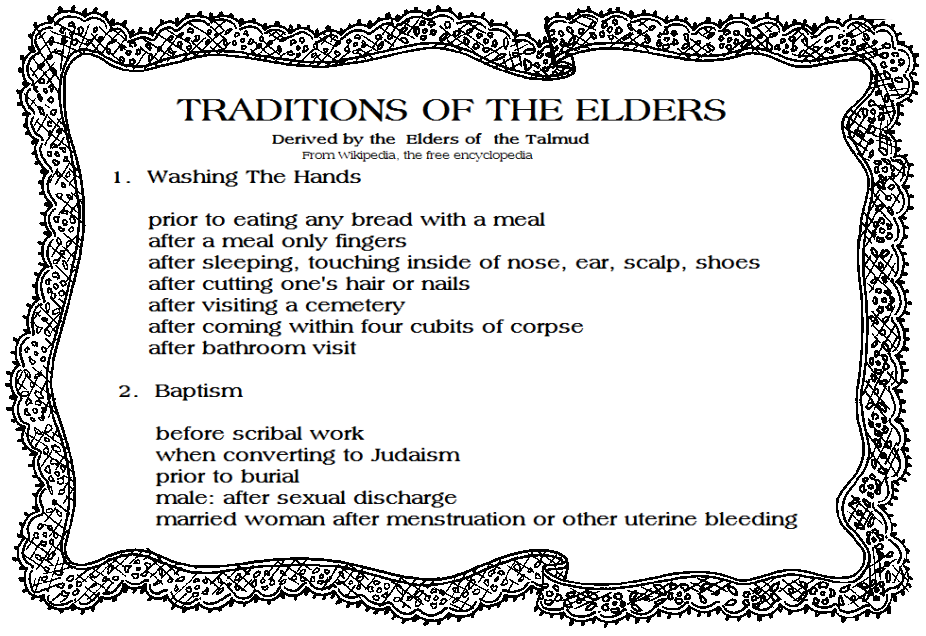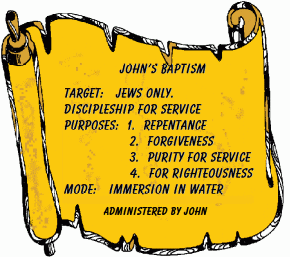 Mikvah:
a collection of water that was used by the Jews for ceremonial baptism
.
--cf.
baptistery
Mikvah:
a collection of water that was used by the Jews for ceremonial baptism
.
--cf.
baptistery
LEAVING THE DOCTRINE OF BAPTISMS #5
THE NEW BAPTISM
BASIC TEXT: “Therefore leaving the principles of the doctrine of Christ, – Of the doctrine of baptisms” (Hebrews 6:1, 2, KJV)
 Mikvah:
a collection of water that was used by the Jews for ceremonial baptism
.
--cf.
baptistery
Mikvah:
a collection of water that was used by the Jews for ceremonial baptism
.
--cf.
baptistery
History of Bathing The Whole Body. Did Queen Victoria bathe only once a year? Throughout history bathing was more popular at some times than at others. But it is apparently untrue that Queen Victoria rarely bathed because a section of the beach on the Isle of Wight was reserved exclusively for her who is reported to have bathed there often.i
Purposes of Bathing. During the Roman Empire era, bath facilities and bathing in public was very popular and expanded throughout the Empire. Not only were they enjoyable but many also bathed according to their respective religious rituals. This was not only true with the idolatrous pagans but also with the Jewish people.ii Jewish sects ceremonially practiced body immersion along with circumcision in their proselytizing.iii They included body immersions in their daily purification routines at home. Archeologists recently have recently discovered in Jerusalem under a residence a rare well-preserved 2,000 year old home bath called by the Jews a “mikvah”iv, a ritual immersion bath structure used for religious cleansings.v

Wedding’s Water Pots. The Bible tells us that the water pots that Jesus used for wine at the Cana wedding were actually for holding water for the home’s ritual cleansings: “Now there were six stone water jars standing there, according to the purification rites of the Jews, each holding two or three measures [around 25 gallons]” (John 2:6, EMTV). A Pharisee condemned Jesus for not “baptizing himself” before a meal: “And in his speaking, a certain Pharisee was asking him that he might dine with him, and having gone in, he reclined (at meat), and the Pharisee having seen, did wonder that he did not first baptize himselfG907 before the dinner” (Luke 11:37, 38, Young’s Literal Translation; cf. ABP+).

Ritual washingsvi
Observed By “All Jews.” Not only were the Pharisees believers in the multiple ritualistic baptisms but the Bible says that “all the Jews” believed with them. Mark wrote (7:3), “allvii the Jews” held this “tradition of the elders.”viii It wasn’t just a Pharisee practice then. The Dead Sea Scrolls reveal to us the Qumran sectarians (Essenes) who baptized for reasons of ritual purity. A first century historian Josephus tells about when he was a teenager he spent three years in the desert with a man named Banus who bathed himself in cold water several times a day.ix These ablution rites were so zealously observed that it is recorded that an imprisoned Rabbi Akiba “preferred dying of thirst to eating without washing his hands.” x

An Unique Baptizer. “In those days, John the Immerser (BaptistēsG910) came proclaiming in the wilderness of Judea” (Matthew 3:1). “John did baptizeG907 in the wilderness, and preach the baptismG908 of repentance for the remission of sins” (Mark 1:4). John’s baptism was different.
Jewish Proselyte Baptism. "...non-Christian baptism had two special characteristics: it was self-administered (people dipped and washed themselves) and it lacked eschatological meaning (not connected to God’s final wrap-up movement of bringing creation to its goal, nor was it something done once and for all)." xi
Some Unique Features Of John's Baptism. (1) First of all, John’s baptism was addressed to the Jews only unlike that required for Gentile proselytes. (2) Second, John administered the baptism to the candidate similar to the ordination the priests to commence tabernacle duty. “I indeed baptize you with water unto repentance” (Matthew 3:11). (3) Third, the baptism was in order to repent from violating God’s Law (Torah of Moses). (4) Fourth, this was purifying from one’s sins; i.e., forgiveness of personal sins to prepare for the imminent Kingdom. (5) Fifth, that was the first and only baptism for the recipient (i.e., the initial members of the Kingdom, e.g., the apostles, were never baptized again). (6) Sixth, John's baptism was administered by another person. (7) Finally, we can add, it had nothing to do with eating but with righteousness, according to Jesus; i.e., obedience to God (Matthew 3:15; Romans 6:16).

Sameness. Someone may suppose that the action of the home and temple baptisms were different from the water immersion introduced by “John the Immerser” and later taught by Jesus. However, in all circumstances a form of the Greek verb baptōG911 (immersion) is used. The inspired writer Mark says that the Jews immersedG909 cups and immersedG907 themselves. Although John is said to have come baptizing (baptizōG907), Josephus (Antiquities xviii.5.2) uses the term baptismosG909 in referring to John’s mode of baptism. Baptizo equals baptismos?
The terms are synonymous. The Greek term for baptism, its cognates, and synonyms (G907- G911) appear 125 times in the New Testament. They refer to the same action. Any differences are in the sentence morphology. For example, Trench in his Synonyms of the New Testament (p. 371) states that the basic Greek verb is the contemplation of immersing an object; the noun G907 refers to an (1) “act of that contemplated immersion completed” while the noun G908 refers to (2) an existing baptism.
Problem? If Jesus accused the elders’ “baptism additions” to the Law as rejecting God’s commandments, should He not also condemn the innovation of John the Baptist’s? Would He say that John, like the Pharisees, had “aphesisG863” and left God’s Law? God did warn in the Law, "Ye shall not add unto the word which I command you, neither shall ye diminish ought from it, that ye may keep the commandments of the LORD your God which I command you" (Deuteronomy 4:2). In what way would John’s baptism be acceptable?
Does not God's prohibition of adding to His commandments exclude His own prophets [but not preachers or teachers or priests or elders]? Did not God have an ongoing revelation of Old Testament Law? “And he said, Hear now my words: If there be a prophet among you, I the LORD will make myself known unto him in a vision, and will speak unto him in a dream” (Numbers 12:6). So if John be a prophet then would his baptism not be authorized by God? Just as the prophet Elisha commanded Naaman to be baptized (2 Kings 5:9f), John could have the authority from God and we shall see that he did. On the other hand, we shall consider that those teachers or elders who would not be prophets cannot add to God's instructions. Is that not why Jesus condemned the Pharisees and scribes and their "elders" about their unauthorized baptisms?
Series to be Continued.
i http://www.bbc.com/news/uk-18867194
ii Jodi Magness. The Archaeology of Qumran and the Dead Sea Scrolls.
iii “The Jews adopted (as a custom unrelated to Divine guidance) the custom of baptizing proselytes seven days after their circumcision. After their baptism, new converts were allowed access to the sacrifices in the Temple.” http://www.bible.ca/ef/topical-baptism-a-prechristian-history.htm
iv Mikvah (cf. baptistery). The Jews would purify themselves before several activities or after certain events that made them unclean. Conversion to Judaism requires submersion into a mikvah. The area around the Temple Mount, especially to the south, is filled with mikvah. A mikvah had to be large enough to allow an average sized person to immerse his whole body. Stairs would be used to descend into and ascend from the mikvah. http://www.generationword.com/jerusalem101/39- mikvah-ritual-baths.html
v http://www.dailymail.co.uk/sciencetech/article-3146085/Ancient-Jewish-bath-discovered-home-Jerusalem-2-000-year- old-miqwe-bears-scars-Roman-city-siege.html#ixzz4dIDmyf00
vi https://en.wikipedia.org/wiki/Ritual_washing_in_Judaism
vii PasG3956 Thayer’s Greek Lexicon--”I. Adjectively...2 with nouns having the definite article [the Jews] ...–with the Plural, “all (the totality, of the persons or the things designated by the noun)”.
viii “The purification rites in Jewish laws and tradition, called "Tvilah", have some similarity to baptism, and the two have been linked.” https://en.wikipedia.org/wiki/History_of_baptism.
ix http://www.josephus.org/JohnTBaptist.htm#Purification
x People’s New Testament. Also, Cambridge Bible for schools and colleges quotes “Buxtorf, Syn. Jud.; quoted in Farrar’s Life of Christ, i. p. 443; Geikie, ii. 203–205. the tradition of the elders], etc.
xi http://www.directionjournal.org/33/1/baptism-among-early-christians.html

|